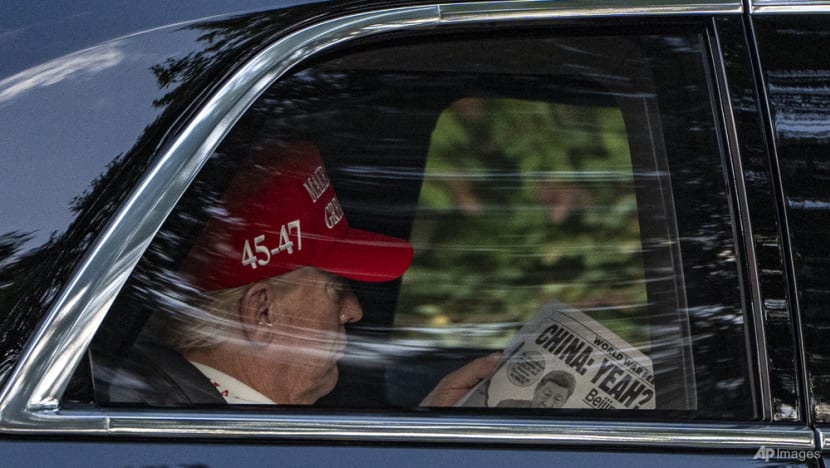Trump threatens additional 50% tariffs on China, terminates talks

WASHINGTON/LUXEMBOURG: US President Donald Trump threatened to further increase tariffs on China on Monday (Apr 7), raising the possibility of further escalation in a trade war that has already wiped trillions of dollars from global markets.
Trump said he would impose an additional 50 per cent duty on US imports from China on Wednesday if the world's No 2 economy did not withdraw the 34 per cent tariffs it had imposed on US products last week. Those Chinese tariffs came in response to 34 percent of the "reciprocal" duties announced by Trump.
"All talks with China concerning their requested meetings with us will be terminated!" he wrote on social media.
US stocks briefly stopped their downward slide after a report that Trump was considering a 90-day tariff pause, then turned negative again after the White House dismissed the report as "fake news." The S&P 500 index was headed toward a 20 per cent drop from its February high.
The European Union said it would start collecting retaliatory duties on some US goods next week, even as officials said they stood ready to negotiate a "zero for zero" deal with Trump's administration.
"Sooner or later, we will sit at the negotiation table with the US and find a mutually acceptable compromise," EU Trade Commissioner Maros Sefcovic said at a news conference.
"He's doubling down on something that he knows works, and he's going to continue to do that," White House economist Kevin Hassett said of Trump on Fox News. "But he is also going to listen to our trading partners, and if they come to us with really great deals that advantage American manufacturing and American farmers, I'm sure he'll listen."
After stocks in mainland China and Hong Kong cratered on Monday, China's sovereign fund stepped in to try to stabilise the market.
Shares in Taiwan plummeted almost 10 per cent - the biggest one-day percentage fall on record.
Related:
Ackman is one of a handful of Trump supporters who questioned the strategy. Billionaire Elon Musk, who is leading Trump's effort to slash government spending, called for zero tariffs between the US and Europe over the weekend.
On Monday, Trump trade adviser Peter Navarro dismissed the Tesla CEO as a "car assembler".
TACTICS OR A NEW REGIME?
Investors and political leaders have struggled to determine whether Trump's tariffs are part of a permanent new regime or a negotiating tactic to win concessions from other countries.
Some in the EU worry that a forceful response risks even more blowback on European exporters of everything from French Cognac and Italian wine to German cars.
Volkswagen's Audi is holding back cars that arrived in US ports after Apr 2 because of the newly imposed 25 per cent auto tariff. Aircraft parts supplier Howmet Aerospace may halt some shipments if they are impacted by tariffs, according to a letter seen by Reuters.
Prime Minister Shigeru Ishiba of Japan, one of Washington's closest allies in Asia, held a phone call with Trump to push for a deal and said he would visit Washington at an appropriate time.
Other governments in Asia have also signalled a willingness to engage.
Taiwan's President Lai Ching-te on Sunday offered zero tariffs as the basis for talks, while an Indian government official said Delhi does not plan to retaliate.
Investors are now betting that the growing risk of recession could cause the US Federal Reserve to cut rates as early as next month. Trump repeated his call for the central bank to lower rates on Monday, but Fed chief Jerome Powell has so far indicated he is in no rush.
TARIFFS COULD REVITALISE ECONOMY: EXPERT
William Lee, chief economist at independent economic think tank Milken Institute, said that while there are "many bad things" about tariffs, they play a role in a "package of revitalisation policies".
"A lot of people are misconstruing this one instrument as the policy package itself," Lee told CNA's Asia First.
"The concern of the marketplace is that if indeed Trump is going to have to enact the rest of the policy package of lower taxes, lower regulation and smaller government, he may have been using up so much of his political capital he won't be able to put in place the rest of the package."
Referring to Trump's medicine analogy, Lee likened tariffs to rat poison - specifically, a drug called Coumadin that is also used to treat or prevent blood clots in humans.
"Too much rat poison, of course, will kill the patient. It's up to the cardiologist to decide how the Coumadin can be used to thin the blood, and at the same time, put together a package of other remedies and therapies to try to get the atrial fibrillation under control so that the patient can get healthy again. Tariffs are exactly like that," Lee said.
Nevertheless, he said Trump has been over-relying on tariffs to tackle other issues like immigration reform and controlling the illegal flow of fentanyl across US borders.
As for whether tariffs will raise the prices of imports, Lee said the key question is whether these higher prices will stick.
He pointed out that demand drives equilibrium prices, and that Americans currently do not have stimulus packages like they were given under former President Joe Biden's administration during the COVID-19 pandemic.
"They're going to be resistant to higher price changes. They're going to look for alternative products which are domestically made, and I don't think a lot of these price changes will stick," Lee added.




















